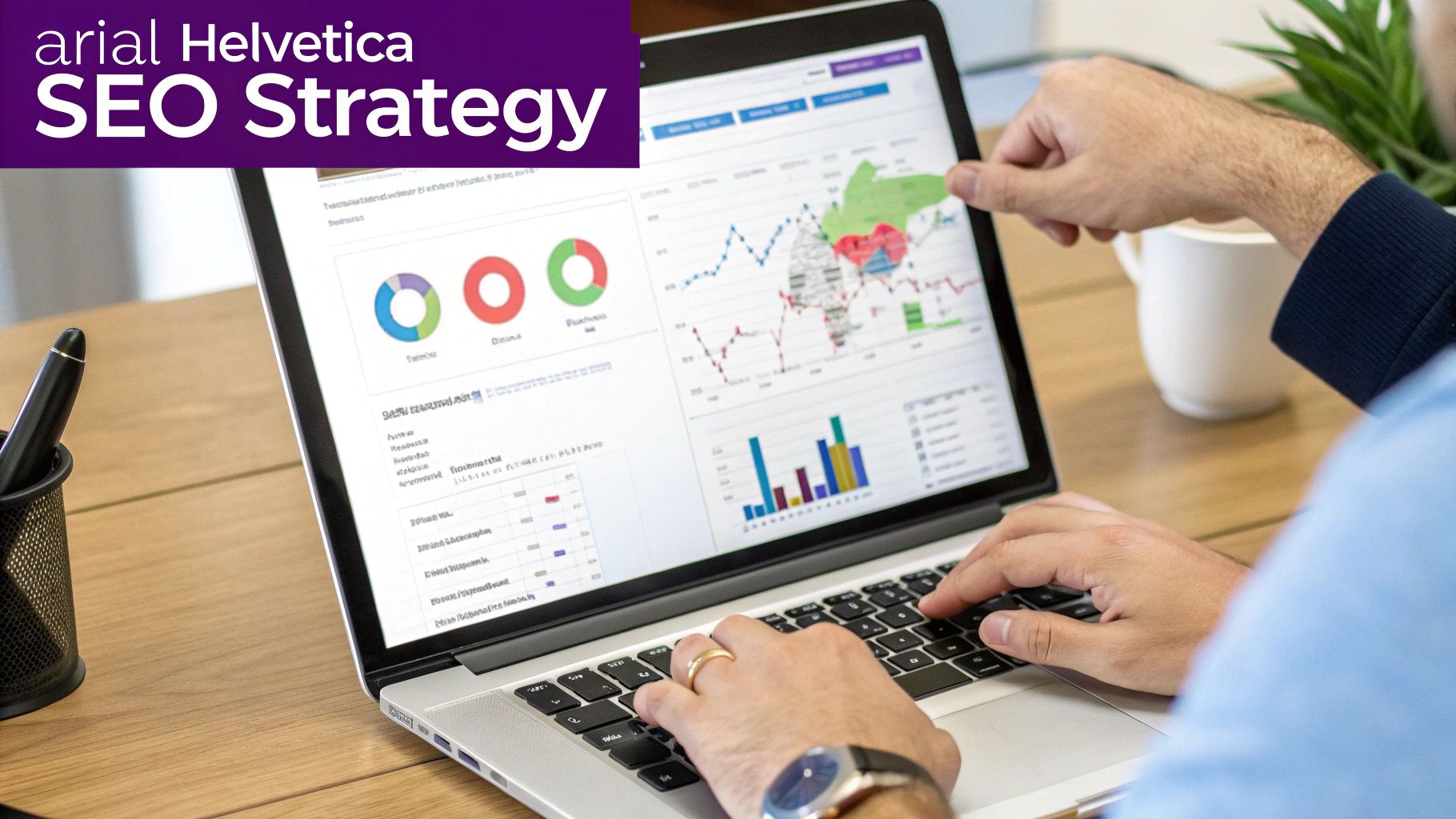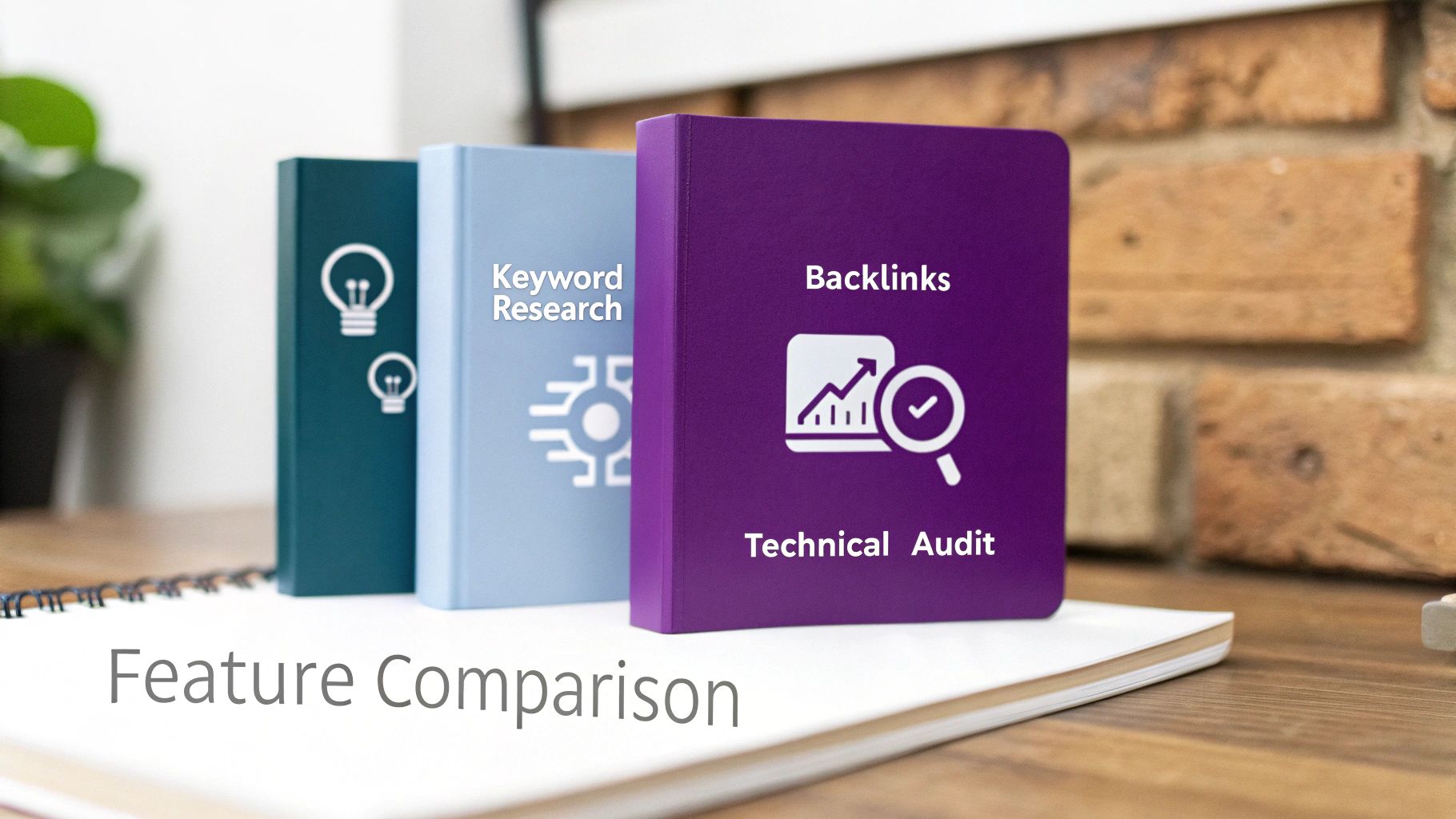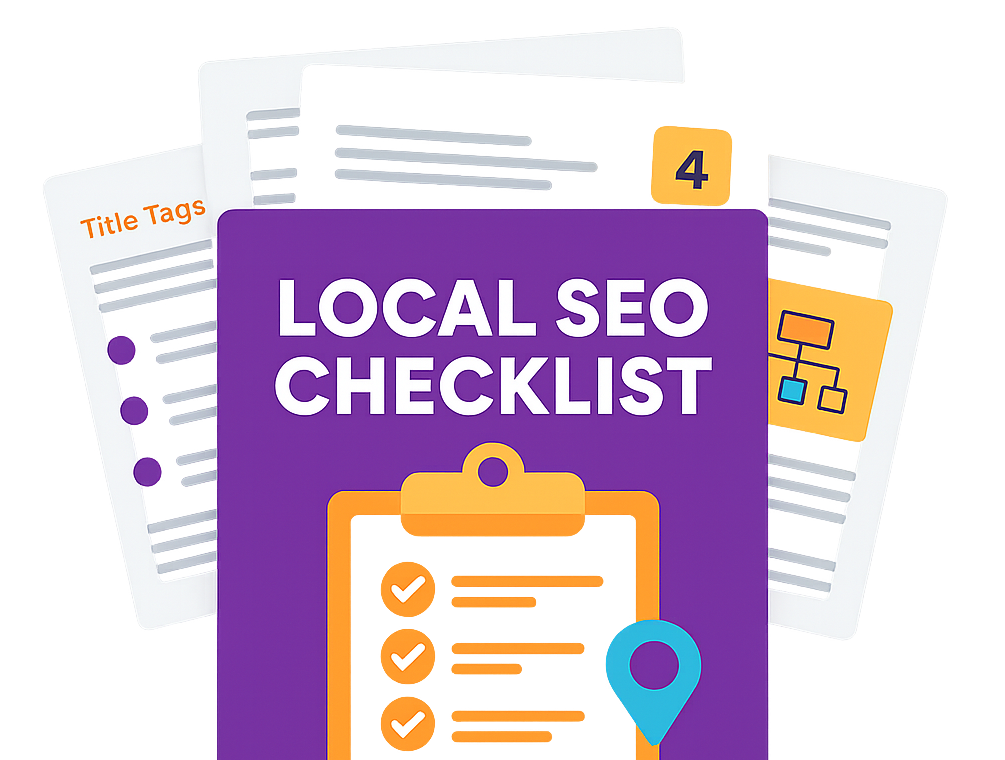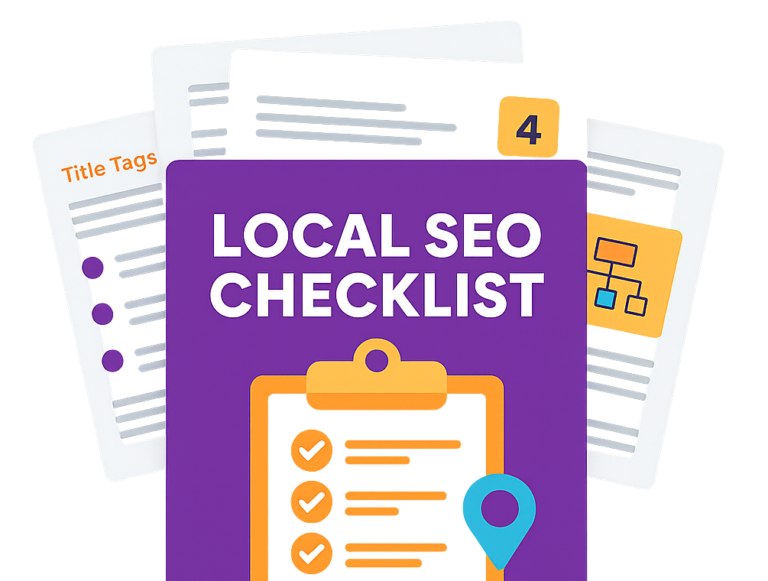Picking the right SEO tool feels a lot like choosing between a comprehensive platform like Semrush, a specialist powerhouse like Ahrefs, or a more user-friendly option such as Moz. Your decision ultimately comes down to balancing what you truly need—like keyword research, backlink analysis, and technical auditing—against your budget and expertise.
Why Choosing The Right SEO Tool Matters For UK Businesses
Selecting the right SEO software is a make-or-break decision for any UK business serious about its online presence. The right platform becomes the command centre for your digital strategy, directly shaping everything from how you stack up against competitors to your bottom line. It’s about moving beyond vanity metrics and getting the deep insights needed to actually win in a crowded market.
This choice is only getting more critical. The global SEO software market is exploding, projected to climb from an estimated £60 billion in 2024 to over £123 billion by 2030. This isn't just a trend; it shows just how much UK businesses are relying on search engine optimisation to drive growth without constantly funnelling cash into paid ads.
Core Functionalities For Success
To compete effectively, UK businesses need tools that deliver on a few non-negotiables. The essentials really boil down to these four areas:
- Granular Keyword Research: Pinpointing high-value search terms specific to the UK market is the only way to attract the right kind of traffic.
- Comprehensive Backlink Analysis: You need to understand your own backlink profile inside and out, as well as your competitors', to build real authority. Our guide on how to conduct competitor analysis goes into more detail on this.
- Precise Rank Tracking: It’s vital to monitor how your site performs on search engine results pages (SERPs) for the keywords you’re targeting.
- Technical SEO Auditing: Finding and fixing the on-site gremlins that are holding back your visibility is a must.
The dashboard from Semrush below gives you a good idea of how these core features often come together, offering a clean overview of a website's organic search performance.

This kind of centralised view helps marketers quickly gauge domain authority, check organic traffic trends, and see keyword rankings at a glance, making it much easier to spot opportunities and threats. A solid tool provides the data-driven foundation that turns SEO guesswork into a clear, actionable plan.
A Quick Look at the Top SEO Platforms
Before we get into the nitty-gritty, let’s start with a high-level overview of Semrush, Ahrefs, and Moz. Think of this as getting to know the core identity of each platform. It’s the first step in figuring out which one is the right fit for your business.
In a nutshell, Semrush is the Swiss Army knife of digital marketing, offering tools that go far beyond just SEO. Ahrefs, on the other hand, is the undisputed champion of backlink data, with an enormous and constantly updated index. Moz shines with its user-friendly interface, making it a fantastic starting point for anyone new to the world of search engine optimisation.
Core Strengths and Who They’re For
Your choice really comes down to what you’re trying to achieve. If you’re juggling SEO, PPC, and content marketing all at once, Semrush is a powerhouse that can handle it all from a single dashboard. But if your main game is link building and keeping a close eye on your competitors’ backlink profiles, the data from Ahrefs is simply unmatched.
For small businesses or sole traders just dipping their toes into SEO, the intuitive design and top-notch educational resources from Moz can make a world of difference. It flattens the learning curve and helps you get results much faster.
To make things even clearer, let's break down the key details of each platform. This quick comparison will help you see which tool aligns best with your business needs and budget before we dive deeper. This is particularly handy for smaller operations, and you can find more tailored options in our guide to the best SEO tools for small business.
Top SEO Tools At a Glance
Here’s a snapshot comparison to help you quickly weigh up the options. This table sums up what each tool does best, who it’s built for, and what it’ll cost to get started.
| Tool | Best For | Key Strength | Starting Price (per month) |
|---|---|---|---|
| Semrush | All-in-one digital marketing | Comprehensive marketing toolset | ~ £105 |
| Ahrefs | Backlink analysis & competitor research | Unrivalled backlink data index | ~ £79 |
| Moz | Beginners & educational resources | User-friendliness & learning support | ~ £79 |
This table gives you a solid starting point. Now, let’s explore what each of these platforms can really do.
Right, let's get into the nitty-gritty. High-level summaries are fine, but to really compare these SEO titans, we need to pop the bonnet and look at the engine. This is where we dissect how Semrush, Ahrefs, and Moz handle the core tasks that drive our daily marketing efforts.
We're going to put them head-to-head across four critical battlegrounds: Keyword Research, Backlink Analysis, Technical SEO Auditing, and Rank Tracking. It’s the subtle differences here that will tell you which platform is the right fit for your workflow, whether you’re a one-person show in Bristol or part of a bigger agency in London.

The Ahrefs interface above is a great example of how a top-tier tool should work. It presents complex data like referring domains and organic traffic in a clean, digestible way, which is exactly what you need for making quick, informed decisions.
Keyword Research Capabilities
Keyword research is the absolute bedrock of any SEO campaign, and it's fascinating to see how each platform approaches it.
Semrush probably has the most sprawling keyword research toolkit of the three. Its Keyword Magic Tool is a genuine powerhouse, capable of spinning a single seed keyword into a massive list of related terms, questions, and phrases. The real game-changer, though, is its ability to automatically group these keywords into semantic clusters. This saves hours of mind-numbing spreadsheet work and helps you build out topic authority far more efficiently.
Ahrefs, on the other hand, is all about the data accuracy in its Keywords Explorer. Its keyword difficulty score is legendary, but the "clicks" metric is where it really shines. This metric estimates how many actual clicks a keyword generates, helping you sidestep those high-volume vanity keywords that get you zero traffic because of SERP features like featured snippets. It's a dose of reality that every SEO needs.
Moz's Keyword Explorer leans into simplicity and smart metrics. Its "Priority" score is a brilliant little feature, blending search volume, difficulty, and organic click-through rate into one intuitive number. For marketers who need to spot high-impact opportunities without getting lost in the weeds, it's incredibly useful.
The critical differentiator here is your workflow. Semrush is built for large-scale content strategy and topic clustering. Ahrefs gives you sniper-like precision for keyword selection. Moz offers a streamlined path to finding quick wins.
Beyond the main tools, it's also about how well they help with effectively generating long-tail keywords that convert. Each platform has its own way of digging up these less competitive, high-intent phrases that often deliver the best ROI.
Backlink Analysis: The Data Titans
A healthy backlink profile is still a massive ranking factor, so being able to analyse your own links—and your competitors'—is non-negotiable. This is where Ahrefs truly flexes its muscles.
Ahrefs has the largest and fastest-updating backlink index on the market, period. Its crawler is so active it's second only to Google's, meaning you see new and lost backlinks almost in real-time. The Site Explorer tool offers an exhaustive breakdown of any domain's link profile, anchor text distribution, and referring domains. For raw, comprehensive link data, Ahrefs is the industry gold standard.
Semrush has a slightly smaller index but makes up for it with its incredible Backlink Audit tool. This feature is a godsend for maintaining website health. It flags potentially toxic or spammy links, integrates with Google Search Console to help you create disavow files, and even lets you build outreach campaigns to remove harmful links right from the platform. It's a complete link management system.
Moz practically invented the concept of Domain Authority (DA), a metric that's now a staple across the industry. Its Link Explorer provides reliable DA scores and solid backlink data. While its index isn't as huge as Ahrefs', its user-friendly reports are perfect for explaining link-building progress to clients or bosses who aren't SEO nerds.
- Ahrefs: The best choice for real-time, comprehensive backlink discovery and deep competitor analysis.
- Semrush: Unbeatable for managing your backlink profile, running health audits, and cleaning up toxic links.
- Moz: Ideal for accessible reporting and tracking authority metrics that are easy for anyone to understand.
Technical SEO Auditing
Technical SEO is the foundation your entire strategy is built on. If search engines can't crawl, index, and understand your site properly, nothing else matters.
Semrush's Site Audit is incredibly thorough, checking for over 140 technical and on-page SEO issues. It neatly sorts problems into errors, warnings, and notices, making it dead simple to prioritise what to fix first. It also provides thematic reports on things like Core Web Vitals, internal linking, and HTTPS implementation, giving you a complete health check.
Ahrefs' Site Audit is another beast, known for being ridiculously fast. Because it's cloud-based, it can crawl enormous websites without making your computer sound like it's about to take off. You get detailed reports on everything from HTML tags and content quality to broken links, and its data visualisations are great for spotting trends and site-wide problems at a glance.
Moz Pro's Site Crawl is more straightforward but still very effective. It flags common technical gremlins like broken redirects and missing title tags and presents the data in a clean, actionable way. It might not be as exhaustive as the other two, but it gives most small to medium-sized businesses everything they need to keep their site in good shape. If you need more niche solutions, checking out a list of the best free website audit tools can help fill any gaps. https://www.bare-digital.com/best-free-website-audit-tools/
Rank Tracking: Accuracy and Localisation
Tracking your keyword rankings is how you measure success. What matters here is accuracy, how often the data updates, and how well it handles local tracking.
Semrush's Position Tracking tool is brilliantly versatile. You can track keywords across different devices and drill down to a specific postcode, which is invaluable for UK businesses targeting local customers. It also monitors SERP feature visibility, so you know if you’re winning featured snippets, image packs, or local packs.
Ahrefs' Rank Tracker delivers reliable daily updates and makes it easy to visualise your progress with clean graphs. You can tag keywords, filter by position, and see how your rankings impact traffic. Its "share of voice" metric is a standout feature, showing you the percentage of traffic from your tracked keywords that you're capturing compared to your competitors.
Moz's Rank Tracker provides dependable weekly updates, which is perfectly fine for many businesses. It offers clear reports on your overall search visibility and lets you benchmark your performance against competitors over time. Like the rest of the Moz suite, its presentation is clean and great for client reporting.
Real-World Use Cases: Which Tool Fits Your Business?
Theory is one thing, but how a tool performs when you’re under pressure to deliver results is another beast entirely. A feature list doesn't tell the whole story. This is where we cut through the abstract and translate features into real-world business scenarios, helping you find the perfect fit.
An SEO tool comparison isn't complete without seeing how these platforms solve actual business problems. We'll explore three distinct UK business profiles, recommending the most suitable tool for each and explaining exactly why its features, data, and pricing make it the ideal choice.

The Manchester Local Service Business
Imagine a plumber or electrician based in Manchester. Their goal is simple: show up in local search results when someone in the Greater Manchester area needs them. They don't care about national rankings or complex content strategies. They just need straightforward, effective local SEO that brings in calls.
For this business, the key requirements are:
- Accurate local rank tracking: Monitoring keyword performance at a postcode level is non-negotiable.
- Google Business Profile management: Keeping their listing optimised and tracking its performance is critical.
- Simple site audits: They need to spot basic on-page issues without getting lost in technical jargon.
Our Recommendation: Moz Pro
Moz Pro is the clear winner here. Its interface is famously user-friendly, making it perfect for a business owner who is an expert in their trade, not in SEO. The rank tracking is solid for local keywords, and its straightforward site crawl tool flags common issues that can be fixed without a deep technical background. It excels at providing clean, understandable data that translates directly to local visibility.
The London E-commerce Brand
Now, picture a fast-growing fashion brand in London, shipping across the UK. Their market is fiercely competitive. Staying ahead means knowing exactly what rivals are doing—from spotting new product trends to seeing which marketing channels are driving their sales.
Their entire focus is on robust competitor intelligence. Success hinges on being able to react quickly and strategically to every move their rivals make, from new backlinks to shifts in keyword strategy.
For this e-commerce brand, the core challenge isn’t just optimising their own site; it’s deconstructing their competitors' success. They need a tool that can reverse-engineer a winning strategy, revealing the keywords, content, and backlinks that drive traffic and sales for others in their niche.
Our Recommendation: Ahrefs
Ahrefs is tailor-made for this scenario. Its backlink index is the best in the business, giving you near real-time updates on what your competitors are up to. The Content Gap tool is invaluable for finding keywords competitors rank for that you’re completely missing. This kind of deep-dive intelligence is crucial for an e-commerce business trying to carve out a larger market share.
If you want to explore more options for this use case, our guide to the best competitor analysis tools provides further insights.
The In-House National Retail SEO Team
Finally, let's look at an in-house SEO team for a large national retailer with thousands of product pages. This team juggles multiple projects, reports to various stakeholders, and needs a tool that can handle complexity at scale. Their needs are worlds away from the other two scenarios.
They need a platform that offers:
- Scalable project management: The ability to organise campaigns by product category, brand, or region.
- Advanced reporting: Customisable dashboards and automated reports for different departments.
- A comprehensive toolset: They handle everything from technical SEO and content creation to PPC analysis.
Our Recommendation: Semrush
Semrush is the undisputed choice for a large, in-house team. Its project-based structure allows for meticulous organisation of complex campaigns. Tools like the Keyword Magic Tool and Site Audit are robust enough to handle enterprise-level websites, while its reporting features make it easy to communicate performance to management. Semrush is an all-in-one suite that provides the sheer breadth and depth required to manage a national SEO strategy effectively.
Analysing Pricing and Value from a UK Perspective
Let’s talk money. When you’re choosing an SEO tool, the monthly fee is just the starting point. For any UK business, the real question is about value – making sure every pound you spend actually moves the needle. This is where a serious SEO tool comparison gets interesting, because the best platform has to fit your budget just as well as it fits your workflow.
We're going to break down the pricing for Semrush, Ahrefs, and Moz, with all the costs laid out in GBP (£). It's easy to get drawn in by the headline price, but the devil is always in the detail. We need to look at the limits on projects, keyword tracking, user seats, and reporting credits, because these are the things that will trip you up as you start to grow.
Comparing Entry-Level Plans
The entry-level plans are the first step for most small businesses, but what they include varies wildly. Ahrefs and Moz offer a more accessible entry point, while Semrush comes in at a higher price, positioning itself as the complete package from the get-go.
Here’s a look at what you get with the most basic paid plans, focusing on the core limits that a small business or startup will hit first.
SEO Tool Pricing and Plan Limits (GBP)
This table gives a quick overview of the starting costs and key limitations for the entry-level plans from Semrush, Ahrefs, and Moz.
| Platform | Plan Name | Monthly Price (£) | Projects/Websites | Keywords to Track | Reports per Day |
|---|---|---|---|---|---|
| Semrush | Pro | ~ £105 | 5 | 500 | 3,000 |
| Ahrefs | Lite | ~ £79 | 5 | 750 | Unlimited* |
| Moz | Standard | ~ £79 | 3 | 300 | Unlimited* |
*Note: While reports might be "unlimited," you’re often capped by a credit system for specific data pulls.
As you can see, Ahrefs gives you more keywords to track for a lower price, whereas Moz’s entry plan feels quite restrictive in comparison. Semrush offers a solid middle ground, though you pay a premium for it. If your budget is tight, it’s also smart to look at effective free lead generation tools to supplement what you get from a paid SEO suite.
Understanding Scaling Costs and Hidden Fees
This is where pricing models can catch you out. As your agency or business grows, your needs get more complex, and the costs can quickly spiral.
One of the most common "hidden" costs is adding more users. Most starter plans are built for one person. Bringing on team members can add a hefty amount to your monthly bill, often £30-£70 per extra user.
The true cost of an SEO platform isn't just its monthly fee but how its limitations align with your growth trajectory. A cheaper plan that you outgrow in three months offers poor value compared to a slightly more expensive one that can scale with you for years.
Project limits are another big one. If you’re an agency juggling multiple clients or a business with several websites, you’ll burn through your project allowance fast, forcing you into a pricier plan much sooner than you anticipated.
Take a look at the Moz Pro dashboard below. This is the kind of campaign overview you'll be living in day-to-day.
Knowing exactly how many of these campaigns you can run is vital for figuring out the real value. You have to map your expected usage against the plan’s limits to avoid any nasty surprises and make sure the tool you choose can support you in the long run.
Making Your Final Decision
So, after digging through all the features, which tool should you choose? It really comes down to your day-to-day priorities. There’s no single "best" platform, just the one that’s the best fit for how you work.
The verdict gets a lot clearer when you look at it that way.
If world-class backlink data is non-negotiable for you, go with Ahrefs. If you need a powerful, all-in-one suite that goes beyond just search engine optimisation, Semrush is your best bet. And if you're looking for a user-friendly platform with fantastic learning resources, especially if you're newer to SEO, start with Moz.
Synthesising Your Choice
To help you lock in your decision, here’s a final breakdown:
- For Data Supremacy: If your entire strategy hinges on deep competitor analysis and link building, you simply can't do without Ahrefs' massive data index.
- For All-Round Capability: If you’re juggling SEO alongside PPC campaigns and content strategy, Semrush offers the most seamless and integrated workflow.
- For Accessibility and Learning: If you value a gentle learning curve and clear, actionable insights above all else, Moz is the ideal starting point.
This infographic breaks down the starting costs, giving you a quick look at the entry-level investment for each tool.

As you can see, while Semrush comes with a higher price tag at the entry-level, Ahrefs and Moz are priced quite closely. This makes their features the real deciding factor.
Honestly, the most important step is to get your hands dirty. Every one of these platforms offers a free trial or a limited free version. Use them. See if the interface, workflow, and data actually click with your brain before you put any money down.
Taking advantage of those trial periods is the smartest way to make a decision you’ll feel good about—one that will genuinely support your business for years to come.
Frequently Asked Questions
When you're comparing SEO software, a few common questions always seem to pop up. Let's tackle them head-on to help UK businesses pick the right tool with a bit more confidence.
Are Free SEO Tools Enough for My Business?
If you're a freelancer just starting out or a brand new business, tools like Google Search Console and Google Analytics are non-negotiable. They give you the foundational data, straight from the source. But that's where their usefulness ends for serious growth.
They lack the competitive intelligence, deep backlink analysis, and strategic keyword features needed to actually compete. To get ahead, you really need a paid platform that can spy on your competitors, run a full technical audit on your site, and uncover the high-value opportunities that free tools are blind to.
Think of it this way: free tools are the dials on your car's dashboard. Paid tools are the advanced sat-nav and radar systems that show you the whole map and what's coming up ahead.
Which SEO Tool Has the Steepest Learning Curve?
This really depends on your own experience with SEO, as the learning curve varies quite a bit from one platform to another.
- Moz Pro is almost universally seen as the most beginner-friendly. Its interface is clean, the metrics are easy to grasp, and it's backed by some of the best educational content in the industry.
- Ahrefs and Semrush are the heavyweights, packed with features that naturally come with a steeper learning curve. Both have improved their user experience over the years, but you’ll need to put in the time to really get the most out of their more advanced functions.
The real question isn't just about how complex a tool is, but whether it fits your team's current skills. A powerful platform is a waste of money if no one has the time or know-how to use its best features.
How Accurate Is Keyword Search Volume Data?
Here’s the thing: no SEO tool can give you 100% accurate search volume data. They all use different data sources and predictive models, not a direct line into Google's live numbers. The figures you see are best treated as solid estimates for comparing keywords and spotting trends, not as gospel truth.
What matters most is consistency. When you're comparing SEO tools, it’s less about finding the one with the "right" number and more about choosing one platform and sticking with it. This gives you a consistent benchmark to measure keyword opportunities, which makes your strategic planning and performance tracking far more reliable.
Ready to move beyond tools and get an expert strategy in place? Bare Digital crafts bespoke SEO services that deliver real, measurable results for UK businesses. Get your free, no-obligation SEO proposal today and see how we can help you climb the rankings.








